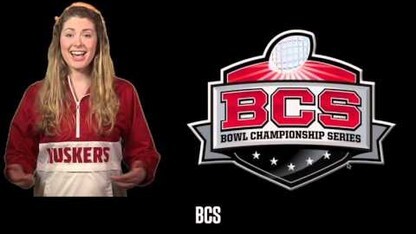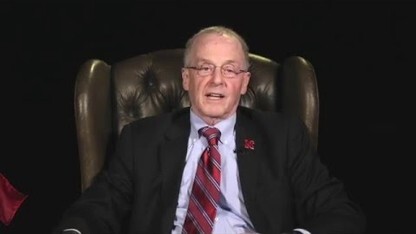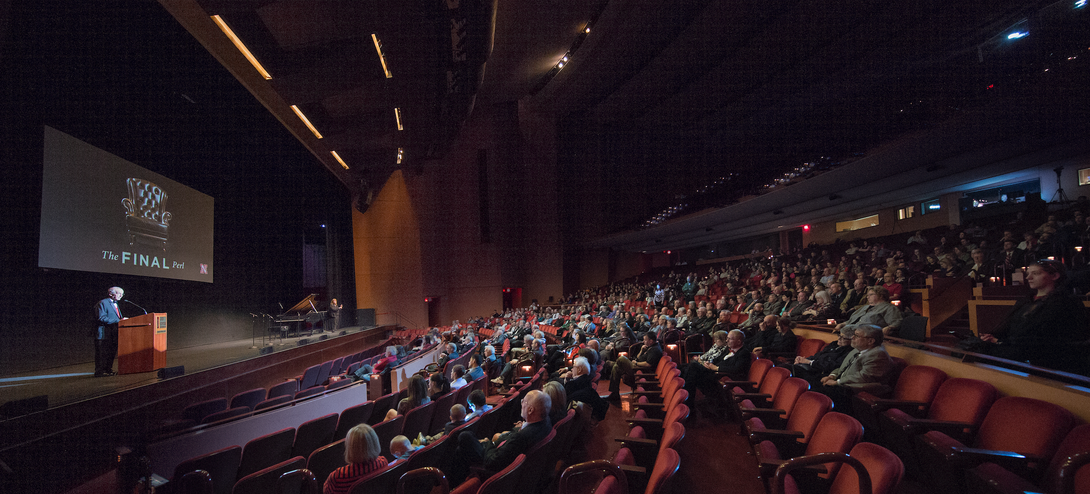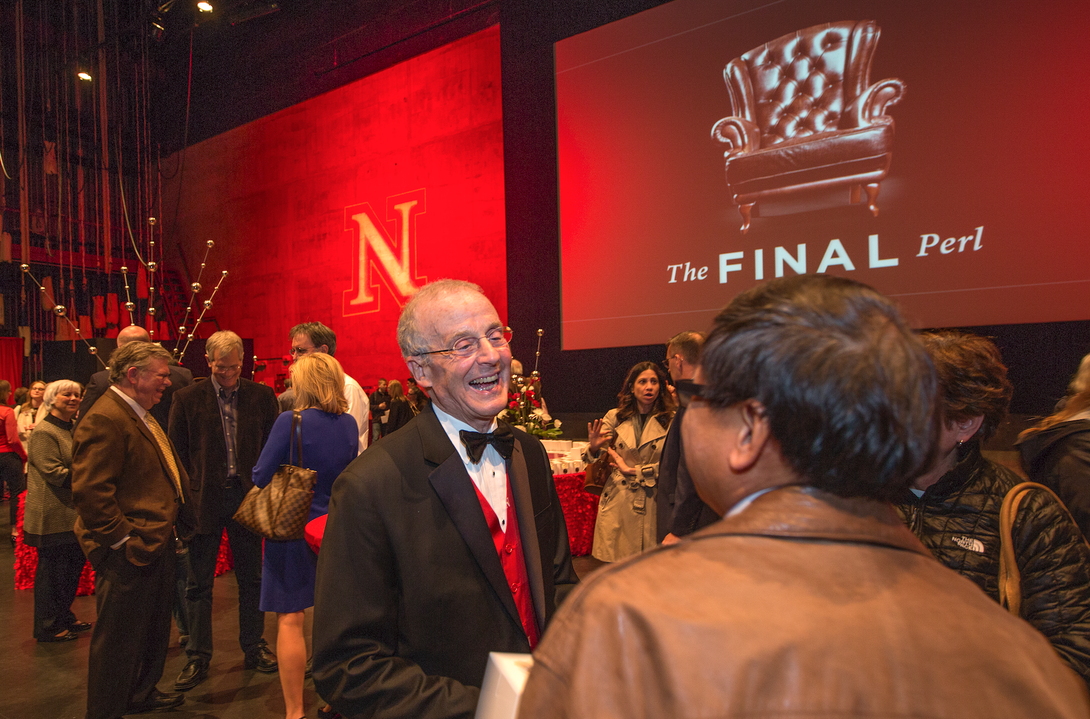
In a sweeping address punctuating his 16-year tenure at the helm of the University of Nebraska-Lincoln, Chancellor Harvey Perlman on April 1 delivered a candid evaluation of the past decade and a half, as well as a frank consideration of the challenges and opportunities ahead.
In what amounted to a 17th and final State of the University speech, Perlman — installed as UNL’s 19th chancellor on this day 15 years ago, following a year of interim service — thanked those who have contributed to an era of unprecedented growth and advancement at the university.
Perlman has announced that he will step down as chancellor on June 30.
Music and entertainment bracketed his talk at the Lied Center for Performing Arts, including a final installment of “Perls of Knowledge,” the trademark comedic video series starring the chancellor that has brought him notoriety and nods from high schoolers to national higher-education media.
“I have been honored in every way to serve as your chancellor for these last 16 years,” Perlman told those in the audience. “It has been extraordinarily fun to share this journey with you.”
That voyage has seen historic advances for the state’s largest public university. Among them are the formation and continued development of Nebraska Innovation Campus; UNL’s 2011 admission to the Big Ten Conference and its Committee on Institutional Cooperation; steady growth in student enrollment resulting in an all-time high in 2015; sustained year-over-year growth in the university’s research expenditures; continued investment in campus infrastructure and facilities; and increased international partnerships.
“As I think back on what our team tried to do to make a difference in this university, the universal truth is that we invested in talent,” Perlman said. “We made small and large bets on existing and prospective faculty who had creative ideas and the qualities necessary to implement them.
“This was not without risk and we had both successes and failures. But I think, on the whole, it explains why the stature of this university is far higher than it was 15 years ago.”
Looking forward, Perlman offered a handful of thoughts about the trials and prospects that lie ahead for UNL, from the need to continue increasing campus diversity and internationalization, to the university’s specific research and teaching role in an ever-changing world, to the future of intercollegiate athletics and the Big Red’s role in that new landscape.
Among the topics Perlman discussed:
UNL’s role in NU, the state and among its peers
The state of Nebraska cannot be competitive, Perlman said, unless it has a cutting-edge, comprehensive research university — and that university, he said, is clearly UNL.
It is critical that UNL stays true to its clear and unique mission and role within the structure of the four-institution NU system, he said.
“Nebraska must recognize the unique opportunities and unique needs of its flagship campus,” Perlman said. “Similarly, we must acknowledge (UNL’s) unique obligations to the state and its people.”
He said that during his time as chancellor, he and others have worked to eliminate what he called “unnecessary rivalries” between UNL and its NU system sister institution, the University of Nebraska at Omaha, as well as between the cities of Lincoln and Omaha. Noting an increased collaboration between the institutions, he cautioned that those who may still try to exploit past rivalries for their own agendas are not serving the state.
“Each university and each city have important ambitions,” Perlman said. “For us, we must measure our competitive success not by looking east to Omaha but beyond to Ohio State, to Penn State and to Purdue.”
City and East campuses and issues of food
If UNL is to be a great university, however, it must be great in the life sciences, Perlman said.
“In many ways, the world is coming to us to help solve emerging issues of scarce food supplies, climate change, water availability and environmental sustainability,” he said. “I believe there has been a significant reduction in the competitive tensions that existed between the East and City campuses. We have even greater opportunities if these tensions continue to abate.”
In his 2015 State of the University address, Perlman proposed a task force on food to explore multidisciplinary opportunities for all disciplines to participate in the university’s food initiative — something that has not yet been realized, he said, but an initiative that continues to be worth exploring.
Faculty who reside on City Campus, especially those in the humanities and social sciences, could contribute to a food initiative to their own benefit, he said.
“Food is at the center of national and world politics, and internationally, food security is probably as large a threat to existing governments as nuclear proliferation,” Perlman said. “The Arab Spring was in part generated by hunger in the Middle East. And how do we confront resistance to genetically modified crops, or chemically based agriculture, or the treatment of food animals in the face of a growing global food shortage?”
Modern Languages
As the campus becomes more diverse, Perlman expressed his hope that UNL will continue to internationalize its programming. International efforts are difficult, he said, and require adaptation of teaching and as well as research practices. But it is central to giving current and future UNL students experiences necessary to compete in an increasingly globalized world.
The field of modern languages can increase its relevance by helping lead these international initiatives, he said.
“Language is the window through which we can better understand and better interact with cultures different from our own,” the chancellor said. “We are naive if we don’t recognize that our future potential partners and our future potential competitors will speak Mandarin and Arabic.”
Arts, humanities, social sciences and Nebraska Innovation Campus
Perlman said the arts, social sciences and humanities can and should contribute to Nebraska Innovation Campus and interact with private and public sectors to advance UNL’s research and economic development strategies.
While “remaining true to their traditions, (these fields) are not diminished if they also explore ways to contribute to very practical ends,” he said. He noted that companies such as Amazon and Google are essentially marketing the humanities — and one of the key gaps in the nation’s security strategy is a failure to employ the social sciences and the humanities.
“Our failure in the Middle East is not the failure of military power, but the failure to account for the teachings of history, the failure to understand the Arabic people through their art, language and literature, and the failure to appreciate the social forces that tend to either hold or divide their societies,” Perlman said.
Engineering
The chancellor reiterated the need to continue to elevate the College of Engineering and make it more competitive among its Big Ten peers. This must happen, he said, despite substantial impediments — the cost and scarcity of engineering faculty, the disinterest and lack of understanding among high school students about engineering careers, aging facilities and the aforementioned Lincoln-Omaha politics.
These barriers are being addressed, he said.
“Given the talent that exists, our expectations for (the College of Engineering) should remain high and we should anticipate significant growth in the next few years in both enrollment and research,” he said. “But a sense of urgency here is important for the success of the university and the state of Nebraska.”
Diversity
“Our state, and accordingly our university, is becoming increasingly diverse – diverse by race, by religion, by nationality, by gender, by sexual orientation,” Perlman said. “However impactful our research, however stimulating our teaching, however effective our engagement with our community, the excellence of this university will increasingly be measured by its success in embracing diverse communities by both respecting their differences while recognizing our commonalities.”
Athletics
On perhaps the most public and often most controversaial aspect of his tenure – Husker athletics – Perlman was characteristically blunt.
“I have to acknowledge that, notwithstanding that I don’t hire football coaches and I don’t call plays, if my success as chancellor is to be measured by the success of our football team, it would be regarded as a failure,” he said. “I accept responsibility for my mistakes here.”
He noted, however, that he became chancellor at the end of a pre-eminent period in the history of Husker football – the first years after the end of the Tom Osborne Era – and suggested that it would have been difficult for any coach or coaching staff to sustain such a high level of winning.
“I have often thought that the critics during these last several years do not give sufficient credit to Tom Osborne, who was, in fact, one of the extraordinary football coaches in the modern era,” he said.
Perlman expressed his confidence that the Husker football program is “as well-positioned as at any time since (Osborne) retired as coach to reach a high level of success. (Husker athletics has) the resources and the leadership to maximize our opportunities” amid an ever-changing landscape of rules and realities in college sports, he said.
Still, his successor will be forced to deal with very real existential threats to college sports. Perlman, who has served on the NCAA’s Board of Directors and is past chair of the Bowl Championship Series Presidential Oversight Committee and the College Football Playoff Association Board of Managers, referred to the NCAA and major athletic conferences facing legal challenges built on the premise that college athletics exploit student-athletes for financial gain.
Individual programs, as well as the major athletic conferences such as the Big Ten, must be careful and smart as they navigate through perilous waters in the years ahead, he said.
“I am confident that Nebraska can be a leader in providing its student-athletes with a positive, healthy experience consistent with the values of higher education,” Perlman said.
“But we should not assume that the world of high-level college sports, particularly football and men’s basketball, will remain the same as it is now without a sustained reform effort — an effort that in many ways Nebraska is leading.”











